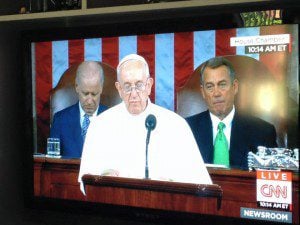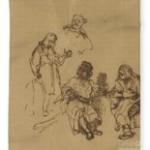The address that Pope Francis gave this morning before Congress was holistic and pro-life. He spoke to the needs of the poor, the dreams of the common man and woman, the preservation of the creation, the devastating impact of violence, the danger of fundamentalism, the fragile nature of the modern family, the death penalty, and the need to protect the unborn. He pointed us to the contemplative, Thomas Merton, and the activist, Dorothy Day. He spoke to the example of Martin Luther King. In short, he preached the Gospel.
But from the moment he began to wade into the specific elements of that picture, the members of Congress (who were generally more positive than usual) began to display the problem with political discourse. Grimacing at times and standing by party political alliance, our nation’s leadership applauded the parts of the speech that they approved. In responding in the way that they did, they displayed their inability — left and right — to listen to anything someone might say that diverges from the political positions that they have already embraced.
In other words, the speech was parsed and evaluated according to its political value. It wasn’t heard or absorbed.
It will be interesting to see how long it takes the press and the American people to follow their example. Sadly, I doubt that it will take long at all.
The Francis Fan Club will shift in membership. Based upon their own political commitments, the press will applaud some portions of his speech, and they will excoriate or suppress other elements of what the Pope said.
Francis had a great deal to say, he also taught us three things about contemporary political dialogue:
One, political discourse has become a dangerous shortcut. In the conduct of our national life it has become enough to pick a party and then use that commitment as a means of taking sides. In taking sides we limit the sources and complexity of our response to any challenge we might face. It may seem harsh to say, but we have become lazy, unreflective, and lacking in nuance to the approach we take to our common life.
Two, political discourse as it is practiced today short-circuits our ability to listen. Exhibit one: the behavior of Congress today. Francis has been crafting messages that are lodged in a set of theological categories that are unfamiliar to most members of Congress. Some of those people didn’t learn anymore today than they already knew. That was clear from their selective and instantaneous response to various parts of the speech that Francis delivered.
Listening requires space, time to reflect, and time to ask questions. We do not pause to make the effort to listen any longer. We evaluate, praise, or condemn, and move on.
Three today’s political discourse has become our one and only approach to reality, eliminating important alternative lenses, many of which are arguably more important. We have been sold implicitly on the notion that we are, above all, political beings and that our most important activity is political in nature.
The speech that Francis gave and the other things that he has said have been hard to comprehend, in part, because they originate from his faith. So, the observations that he has made about a variety of “hot button” issues have hit the public and the press at “sixes and sevens,” leaving people confused about where he stands.
But that is not Francis’s problem. It’s ours. Weighing the world politically has narrowed our vision of the world.
As a result, we have impoverished life. We have narrowed our approach to the challenges that we face. Inevitably, we have also lost track of the contribution that we can make, consigning the world’s needs to a fallible political class. They have a contribution to make, but they are limited in their ability and their resources.
In addressing not just Congress, but the American people, Francis reminded us that we are responsible as well. One can only pray that we will begin to listen.
Photo by Rob Rocha, used with permission













